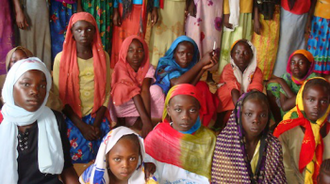Judge brands UK treatment of Sudanese torture victim 'disgraceful'

Darfur women in Chad refugee camp
It is rare to get good news about refugees these days. However, a recent High Court judgement has delivered a slap on the British government's wrist, offering a glimmer of hope for those fleeing persecution.
A woman from war-torn Darfur who was repeatedly raped and tortured by agents of the Sudanese regime, has scored a victory against the Home Office. The woman is known as IKM to protect her identity. Her detention, and plans to deport her, her were condemned by a judge as 'disgraceful.' Yet, given the obvious physical proof of what she endured, her case raises questions about a system that disbelieves dissidents, even when they have vivid torture marks to prove their claims.
Refugees from Sudan form a large proportion of the world's asylum seekers. They receive comparatively little media attention, but atrocities against minorities in Darfur and other marginalised regions have led to an exodus from the arid African nation. Last year the number of Sudanese asylum applications to the UK doubled.
Waging Peace and our sister charity Article 1 support Sudanese asylum seekers as they try to navigate the UK's immigration system. We find lawyers and evidence, attend hearings and visit those in detention with urgent needs such as mental health support and contacts in the Sudanese Diaspora. We also act as a bridge to learning, understanding and adapting to British culture and life. Our experience, accompanying IKM through her legal ordeal, highlights failings in a system geared to undermining those genuinely seeking asylum.
IKM asked us to be by her side at her hearing at The Royal Courts of Justice. Given the trauma she had suffered at the hands of her own government, she is vulnerable, suffering Post-Traumatic Stress Disorder and flashbacks. Ten years ago she was an accountant in the Sudanese capital, Khartoum. She returned to her home in Darfur when the government's proxy militia, the Janjaweed, killed her father. They subsequently kidnapped her mother, killed her fiance and shot and raped IKM. Her family were among hundreds of thousands of victims of the regime's ethnic cleansing policies aimed at destroying the country's Black African minorities.
Before IKM escaped to Europe she was detained, tortured, beaten, stabbed and raped by agents of the Sudanese regime several times. Incredibly, she was placed in detention, prior to deportation from the UK. By the time she reached the Royal Courts of Justice her inner strength and willingness to survive had been tested to breaking point.
We were not optimistic about IKM's chances. Her trial took place in an unforgiving political climate, with the Home Secretary Theresa May's vitriolic speech about the UK asylum system ringing in our ears. Although it was not necessary for IKM to attend, she insisted, despite her mobility difficulties, thanks to the torture she endured in Sudan. Her legal team had warned her decisions in this type of proceeding usually took two to three months to be rendered.
Nonetheless, IKM told Waging Peace she was determined to look the Home Office representatives in the eye, as long as we were by her side. It came as a surprise to her legal team when it became clear the High Court judge was going to rule in favour of IKM after only two hours. It was even more unexpected when Judge Collins announced he had heard and read enough and would announce his decision after lunch.
As the courtroom cleared we - IKM, her barrister, solicitor and Waging Peace - gathered. IKM was shaking with fear, and clearly traumatised from listening to officials debate intimate details of her torture. When she calmed down enough, her legal team advised her that against all the odds, it seemed the judge might find in her favour. She broke down and cried with like relief.
When we returned to the courtroom, Judge Collins delivered his ruling in language that left no room for doubt. He expressed his emphatic disapproval over the "disgraceful treatment" IKM sustained at the hands of the Home Office.
With so much general media coverage and emphasis on migration, there is little attention to what happens to displaced people when they enter the UK. How many of us recognise that holding a person's hand, offering a smile or a kind gesture of solidarity can make a huge difference to someone like IKM, a person trying to survive abroad, and alone? Compassion and humanity truly reached the High Court on October 7 in the form of Judge Justice Collins.
IFM thanked Waging Peace for being her "lifeline." With good reason, IKM's trust in people has been non-existent, so it is a credit to the integrity of the team that she does trust us.
If you would like to support Waging Peace and enable us to assist others like IKM, please visit: www.wagingpeace.info/
Sonja Miley is Community Engagement Officer at Waging Peace















